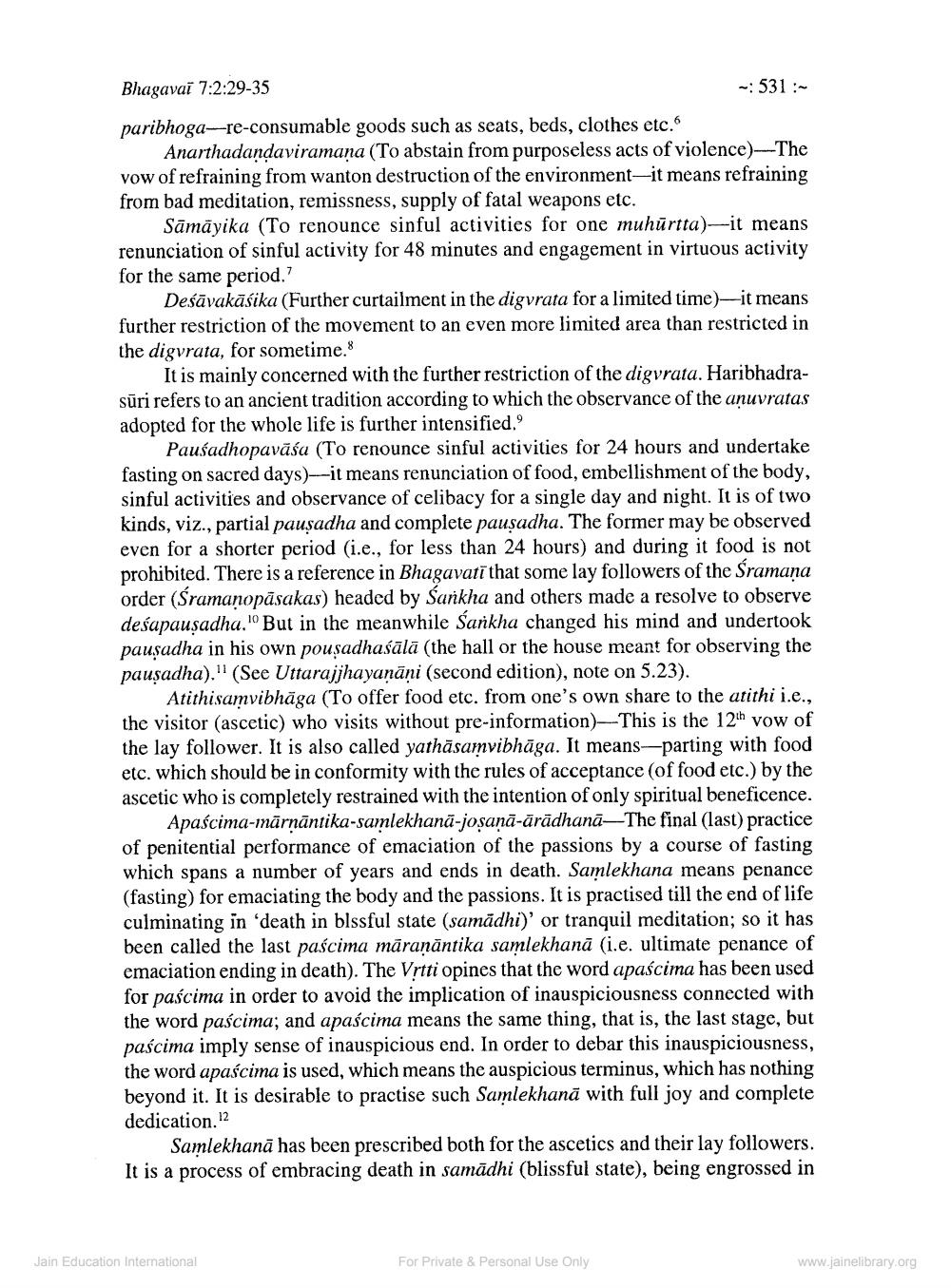________________
Bhagavai 7:2:29-35
-:531 :paribhoga--re-consumable goods such as seats, beds, clothes etc.
Anarthadandaviramana (To abstain from purposeless acts of violence)--The vow of refraining from wanton destruction of the environment-it means refraining from bad meditation, remissness, supply of fatal weapons etc.
Sāmāyika (To renounce sinful activities for one muhūrtta)-it means renunciation of sinful activity for 48 minutes and engagement in virtuous activity for the same period.'
Deśāvakāśika (Further curtailment in the digvrata for a limited time)-it means further restriction of the movement to an even more limited area than restricted in the digvrata, for sometime.
It is mainly concerned with the further restriction of the digvrata. Haribhadrasūri refers to an ancient tradition according to which the observance of the anuvratas adopted for the whole life is further intensified,
Pausadhopavāśa (To renounce sinful activities for 24 hours and undertake fasting on sacred days)-it means renunciation of food, embellishment of the body, sinful activities and observance of celibacy for a single day and night. It is of two kinds, viz., partial paușadha and complete pausadha. The former may be observed even for a shorter period (i.e., for less than 24 hours) and during it food is not prohibited. There is a reference in Bhagavati that some lay followers of the Sramana order (Šramanopäsakas) headed by Sarkha and others made a resolve to observe deśapausadha." But in the meanwhile Sarkha changed his mind and undertook paușadha in his own poușadhaśālā (the hall or the house meant for observing the pausadha)." (See Uttarajjhayanāni (second edition), note on 5.23).
Atithisamvibhäga (To offer food etc. from one's own share to the atithi i.e., the visitor (ascetic) who visits without pre-information - This is the 12th vow of the lay follower. It is also called yathāsamvibhāga. It means-parting with food etc. which should be in conformity with the rules of acceptance (of food etc.) by the ascetic who is completely restrained with the intention of only spiritual beneficence.
Apaścima-mārnāntika-samlekhanā-joșaņā-ārādhanā—The final (last) practice of penitential performance of emaciation of the passions by a course of fasting which spans a number of years and ends in death. Samlekhana means penance (fasting) for emaciating the body and the passions. It is practised till the end of life culminating in death in blssful state (samadhi)' or tranquil meditation; so it has been called the last paścima māraṇāntika samlekhanā (i.e. ultimate penance of emaciation ending in death). The Vrtti opines that the word apaścima has been used for paścima in order to avoid the implication of inauspiciousness connected with the word paścima; and apaścima means the same thing, that is, the last stage, but paścima imply sense of inauspicious end. In order to debar this inauspiciousness, the word apaścima is used, which means the auspicious terminus, which has nothing beyond it. It is desirable to practise such Samlekhanā with full joy and complete dedication.2
Samlekhanā has been prescribed both for the ascetics and their lay followers. It is a process of embracing death in samādhi (blissful state), being engrossed in
Jain Education International
For Private & Personal Use Only
www.jainelibrary.org




